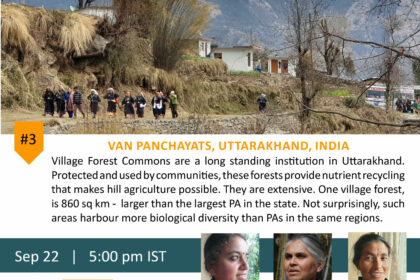CCA South Asia Webinar Series #3: Van Panchayats, Uttarakhand (22nd September, 5pm IST)

About the Talk
Village Forest Commons are a long-standing institution in Uttarakhand that pre-dates the current format of the Van Panchayats yielded by the colonial British after their regional appropriation of all lands. Like true commons, these forest and rangeland commons have been protected and used by village communities primarily to meet their subsistence needs of fuelwood, fodder and small timber as also providing the critical nutrient cycling of compost that makes hill agriculture possible at all. Though currently facing a slew of incremental measures to control and commercialize these forests they remain, wherever communities are still dependent on agriculture and pastoralism, their live support base. In such area, especially at higher altitudes village forests and rangelands are extensive, constituting over 60% of the landscape in the Gori river basin. One village forest, for instance, covers about 860 sq km, larger than the largest protected area in the state. Not surprisingly, such areas harbour wildlife and biological diversity comparable to Protected Areas in the same geographical zones.
Join us as the speakers discuss the persisting relevance of Van Panchayat in the face of the larger dismantling of Commons worldwide, the continued dependence of poorer households for their livelihoods, rapidly dwindling biological diversity everywhere and the critical the need for forests and wild spaces in the cultural and economic context.
Malika Virdi is her second term as Sarpanch, the elected head of the Sarmoli- Jainti Van Panchayat.
Rekha Rautela is a panch (elected representative) of Sarmoli Van Panchayat
Beena Nitwal is a panch (elected representative) of Sankhdhura Van Panchayat
To join the webinar: https://us02web.zoom.us/j/82247993867
View the previous webinars:
For any query or to sign up to the CCA South Asia e-list, please write to [email protected]
